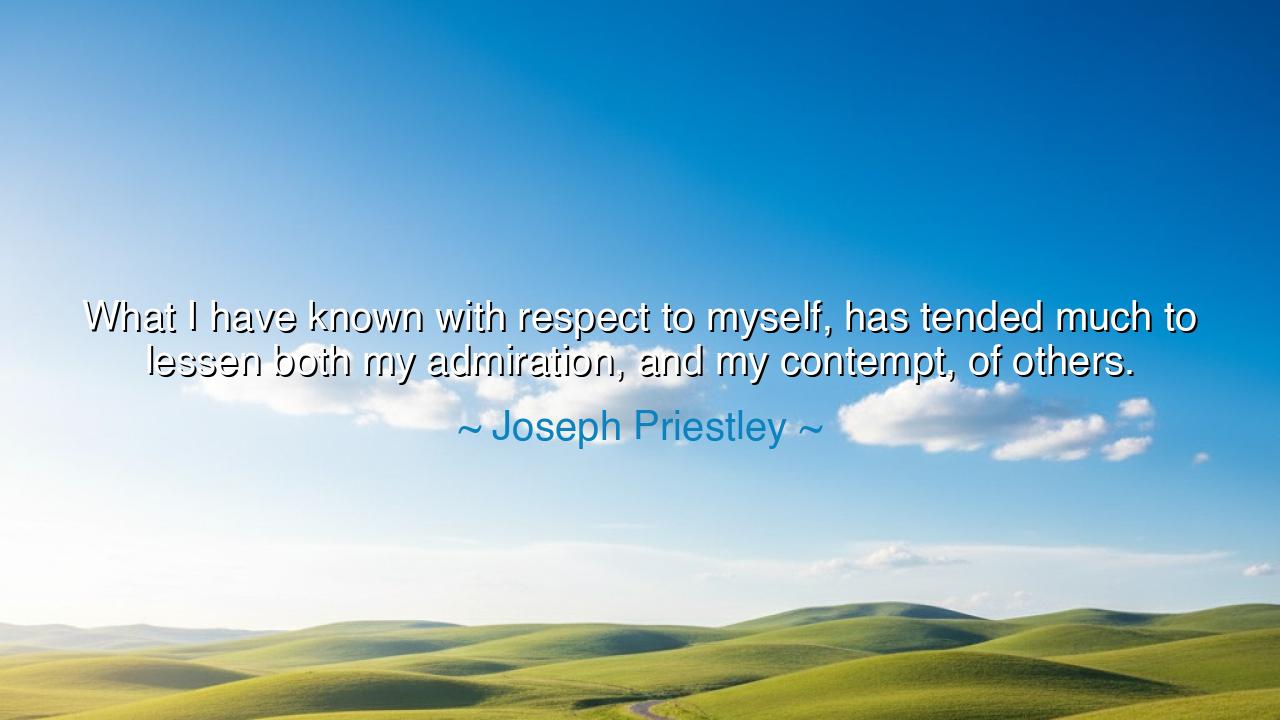
What I have known with respect to myself, has tended much to
What I have known with respect to myself, has tended much to lessen both my admiration, and my contempt, of others.






The words of Joseph Priestley—“What I have known with respect to myself, has tended much to lessen both my admiration, and my contempt, of others”—are a reflection born from deep self-awareness and humility. They remind us that through the mirror of self-knowledge, the extremes of judgment—both idolization and disdain—begin to fade. Priestley, a man of science and spirit, speaks here not merely as a philosopher, but as a soul who has gazed into the depths of his own nature and found there the full range of human contradiction. In his insight lies a timeless wisdom: when one truly understands one’s own weaknesses, desires, and failings, the illusions that separate us from others dissolve. We learn that the heroes we admire are as flawed as we are, and the sinners we despise are as human as we.
Priestley was a man who lived between worlds—a scientist and a theologian, a seeker of truth in an age of reason. He discovered oxygen, yet he also wrote passionately on the moral and divine order of the universe. His intellect was vast, but his heart remained tethered to humility. This quote likely sprang from the tempering of his experience: for in the pursuit of knowledge, he came to see not only the majesty of human reason but also its frailty. As he came to know himself—his pride, his doubts, his errors—he found that both excessive admiration and contempt were distortions of truth. To know oneself is to realize how much light and shadow coexist within every soul.
In the ancient world, the oracle of Delphi bore a simple command: “Know thyself.” Priestley’s reflection is a modern echo of that eternal call. Self-knowledge does not glorify nor condemn—it clarifies. When we look inward with honesty, we discover that our virtues are often born of circumstance, and our failings of frailty shared by all. This realization humbles us, and in that humility, compassion is born. The one who knows his own heart no longer kneels before others in blind admiration, nor raises his hand in self-righteous scorn. He sees all people as fellow travelers—each carrying burdens unseen, each striving, stumbling, and rising again.
Consider the life of Marcus Aurelius, the philosopher-emperor of Rome. He ruled an empire, yet wrote privately in his Meditations of his constant struggle against anger, pride, and desire. Though the world saw him as a godlike ruler, he saw himself as a man wrestling with the same impulses as any other. His self-awareness prevented him from despising his enemies or worshiping his allies. He understood, as Priestley did, that understanding oneself tempers judgment. The greater one’s self-knowledge, the more mercy one has for others—for the faults we condemn in others are often but reflections of our own.
Priestley’s insight also speaks to a deeper paradox of the human condition: that our admiration and contempt both spring from ignorance. When we do not truly know a person, we fill the gaps of understanding with fantasy. We exalt them as saints or condemn them as villains. But as soon as we see them as they are—complex, imperfect, and human—the illusion shatters. The saint becomes a man, and the villain becomes a soul caught in struggle. Self-knowledge awakens empathy, for it teaches us that the boundaries between good and evil, between wisdom and folly, do not lie between people—they run through every heart.
There is a quiet heroism in this humility. To know oneself honestly is to strip away the masks that vanity and fear have built. It is not an act of weakness, but of courage. For most flee from their own reflection, terrified of what they might find. Priestley did not flee—he looked inward and emerged wiser. And in that wisdom, he saw all humanity reflected. He learned that true strength lies not in exalting oneself above others, but in recognizing the shared struggle that binds all beings together in the fragile web of existence.
The lesson of Priestley’s words is clear and enduring: before you admire or condemn, look within. Understand that what you see in others—greatness or failure, kindness or cruelty—is but a reflection of the same potential within yourself. Let your admiration inspire, but not blind you; let your contempt instruct, but not harden you. The wise do not worship or despise—they understand. And through understanding, they love.
So, my child, walk through life with eyes turned both outward and inward. Honor those who do good, but remember their humanity. Forgive those who err, for their errors are the echoes of your own. Strive to know yourself, for that is the beginning of wisdom. When you understand your own heart—its frailty and its fire—you will cease to live in extremes. You will neither bow nor scorn, but stand equal among your fellow beings, your heart steady with respect, humility, and compassion. For this, as Priestley teaches, is the true fruit of self-knowledge: not pride, not shame, but peace.






AAdministratorAdministrator
Welcome, honored guests. Please leave a comment, we will respond soon